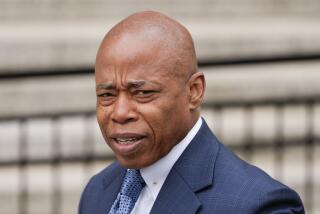Bonds’ Attorneys Set to Defend Any Charges
- Share via
With time apparently drawing down on a federal grand jury investigating potential tax evasion and perjury charges, one of Barry Bonds’ attorneys said Friday a defense team stands ready to contest an indictment against the San Francisco Giants standout that could be returned as soon as next week.
Amid widespread belief that the term for the San Francisco grand jury investigating Bonds ends within days, attorney Laura Enos said in a telephone interview, “There is no assurance there’s going to be an indictment. No, none.”
But if an indictment were to be returned, she said, “It’s not that big a deal,” explaining that position with a turn to a famous legal maxim: “If a prosecutor is motivated enough and has made a significant investment of government resources, you can indict a ham sandwich.”
If charged and convicted of perjury, Bonds, 41, could face up to five years in prison. An issue for prosecutors is that any case against Bonds would come against the backdrop of the BALCO scandal, which produced convictions -- but yielded prison terms of only a few months -- for his personal trainer, Greg Anderson, BALCO founder Victor Conte and others. BALCO, or Bay Area Laboratory Co-Operative, is the nutritional supplement lab at the center of doping scandals in track and field as well as baseball.
The perjury investigation of Bonds, who is second on baseball’s all-time home run list, revolves around his assertions that he had not used performance-enhancing substances.
Evidence in the matter includes documents from among the 30,000 pages seized as part of the BALCO matter.
The San Francisco Chronicle, citing from Bonds’ appearance before a federal grand jury in 2003, said prosecutors described documents believed to reflect payments for drugs for Bonds.
Other documents, the paper has reported, reflect what prosecutors believed was Bonds’ doping cycle. Still others, according to the Chronicle, carry markings for Bonds’ initials and the year -- “BLB 2003” -- and detail the Giants’ 2003 schedule as well notations for the use of a variety of performance-enhancing drugs, including steroids.
In his December 2003 grand jury testimony, according to the Chronicle, Bonds said he never knowingly used illicit substances. He said Anderson had given him only flaxseed oil and arthritis balm.
The Chronicle reported Friday that Bonds, in a July 2003 meeting with an FBI agent and a federal prosecutor, said he had “never” used steroids.
Luke Macaulay, a spokesman for the U.S. Attorney’s office in San Francisco, declined to comment Friday.
The U.S. 9th Circuit Court of Appeals in San Francisco refused to free Anderson from custody Friday. On July 5, a federal judge had ordered Anderson back to jail after he would not to testify before the grand jury.
The tax inquiry purportedly revolves around money from the sales of Bonds baseball memorabilia, including cash allegedly given to a former girlfriend, Kimberly Bell.
Another of Bonds’ attorneys, Michael Rains, has identified Bell and Steve Hoskins, Bonds’ former business partner and longtime friend, as witnesses against the Giants slugger. Rains could not be reached Friday for comment.
The Chronicle, again citing grand jury testimony, reported Bell has testified that Bonds told her of steroid use and that he was given to rages she attributed to steroid use.
Hoskins, a boyhood friend, went into business with Bonds, selling signed jerseys, bats and baseball cards. But the friendship fell apart in 2003. Enos told the Associated Press the rift developed amid Bonds’ accusations that Hoskins forged his signature on at least two endorsement deals and sold Bonds’ gear without permission.
Hoskins’ attorney, Michael Cardoza, told the AP, “I’m laughing because I love this defense. Tell them to think of a better story. Tell them to put that defense on and to keep believing their client. They’re going to get it shoved down their throats.”
Enos said the government has “spent millions of dollars, millions, looking for witnesses, chasing down people who knew Barry in 1998, just going down every foxhole they could possibly find. And after four years of investigation and the expenditure of millions of dollars, I suppose they are motivated to try to get an indictment.
“But that doesn’t make a case.”
Asked if she and Bonds’ other attorneys were preparing for an indictment, she said, “We are not gearing up for an indictment, in that sense. We are pursuing a factual investigation. We have been doing that for three years.”
Bonds, a seven-time National League most valuable player, has struggled this season and last with injuries; his batting average is mired at .246 after he walked in both his at-bats in the Giants’ 5-3 victory over Philadelphia on Friday. Bonds, who also scored two runs in that game, has hit 12 home runs this season, lifting his career mark to 720, second to Hank Aaron’s 755.
Bonds holds the single-season home run record of 73, set in 2001.
It is unclear what action, if any, baseball Commissioner Bud Selig would take if Bonds were indicted. In general, professional sports leagues have tended to allow the legal process to run its course -- baseball in particular since the 1980s case of pitcher Ferguson Jenkins, who was suspended by Major League Baseball upon a drug-related arrest in Canada. The major league players’ union filed a grievance; the suspension was lifted.
Times staff writer Tim Brown contributed to this report.
More to Read
Go beyond the scoreboard
Get the latest on L.A.'s teams in the daily Sports Report newsletter.
You may occasionally receive promotional content from the Los Angeles Times.










